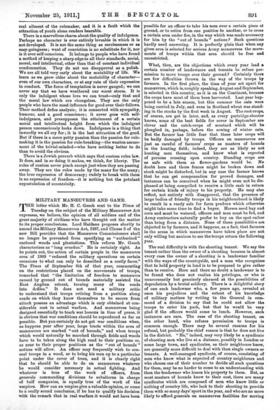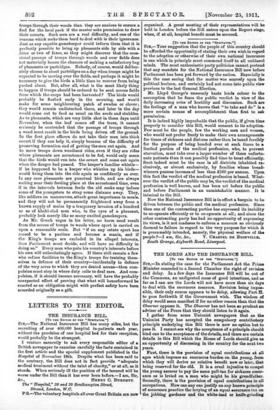MILITARY MANCEIJYRES AND GAME.
THE letter which Mr. H. C. Gooch sent to the Times of Tuesday on the subject of the Military Manoeuvres Act expresses, we believe, the opinion of all soldiers and of the great majority of civilians who have thought out the matter to its proper conclusions. Lord Haldane proposes shortly to amend the Military Manoeuvres Act, 1897, and Clause 2 of the new Bill provides that the Manoeuvre Commissioners shall no longer he prevented from specifying as " authorized " enclosed woods and plantations. This reform Mr. Gooch characterizes as "long overdue." He is certainly right. As he points out, the action of certain people in the manoeuvre area of 1909 " reduced the military operations on certain occasions to what can only be described as a costly farce." The Times of September 6th of that year, commenting on the restrictions placed on the movements of troops, remarked that " the limitation of freedom to manoeuvre caused by ground out of bounds materially assisted the East Anglian retreat, turning many of the roads into defiles." It does not need a military critic to understand that troops retiring from a position along roads on which they know themselves to be secure from attack possess an advantage which is only obtained at con- siderable cost in actual warfare. And manoeuvres being designed essentially to teach war lessons in time of peace, it is obvious that war conditions should he reproduced as far as possible. But you certainly do not get war conditions when, as happens year after year, large tracts within the area of manoeuvres are marked " out of bounds," and when troops which would naturally be marched through fields and woods have to be taken along the high road to their positions or, as near to their proper positions as the "out of bounds" notices will allow. An officer may frequently wish to con- ceal troops in a wood, or to bring his men up to a particular point under the cover of trees, and it is clearly right that he should be able to do on manoeuvres whatever he would consider necessary in actual fighting. And whatever is true of the work of officers, from generals commanding divisions to subalterns in charge of half companies, is equally true of the work of the umpires. How can an umpire give a valuable opinion, or come to 'a really sound conclusion, if he has to qualify his decision with the remark that in real warfare it would not have been
possible for an officer to take his men over a certain piece of ground, or to retire from one position to another, or to cross a certain area under fire, in the way which was made necessary for him by the "out of bounds " notices ? Such questions hardly need answering. It is perfectly plain that when any given area is selected for serious Army manoeuvres the move- ments of troops within that area should be free and unrestricted.
What, then, are the objections which every year lead a certain number of landowners and tenants to refuse per• mission to move troops over their ground ? Certainly there are few difficulties thrown in the way of the troops by farmers. In the first place, the time of year set apart for manoeuvres, which is, roughly speaking, August and September, is selected in this country, as it is on the Continent, because the crops have most of them been harvested. Last year hap- pened to be a late season, but this summer the oats were being carried in July, and even in Scotland wheat was stand- ing in the stooks by the first week in August. The root crops, of course, are got in later, and, as every partridge-shooter knows, some of the best fields for cover in September are clover and the catch-crops of mustard which will be ploughed in, perhaps, before the sowing of winter oats. But the farmer has little fear that these later crops will be badly damaged by troops. Officers on manoeuvres are just as careful of farmers' crops as masters of hounds in the hunting field; indeed, they are as likely as not hunting men themselves, and know what is expected of persons crossing open country. Standing crops are as safe with them as flower-gardens would be. No doubt here and there fences might be broken down and stock might be disturbed, but in any case the farmer knows that he can get compensation for proved damages, and instances can be conceived when he might even not be dis- pleased at being compelled to receive a little cash in return for certain kinds of injury to his property. He may also reflect, not entirely with disapproval, that the presence of large bodies of friendly troops in his neighbourhood is likely to result in a ready sale for farm produce which otherwise might take some time to find a buyer. Horses need hay and corn and must be watered, officers and men must be fed, and Army contractors naturally prefer to buy on the spot rather than bring from a distance. None of these possibilities are objected to by farmers, and it happens, as a fact, that farmers in the areas in which manoeuvres have taken place are not only willing but anxious to see the troops return the following year.
The real difficulty is with the shooting tenant. We say the tenant rather than the owner of a shooting because in almost every ease the owner of a shooting is a landowner familiar with the ways of the countryside, and a man who recognizes that to hold property in land is to be prepared to give rather than to receive. Here and there no doubt a landowner is to be found who does not realize his privileges, or who is unnecessarily but genuinely alarmed at the possibilities of depredation by a brutal soldiery. There is a delightful story of one such landowner who, a few years ago, revealed at once his prejudices and the extent of his knowledge of military matters by writing to the General in com- mand of a division to say that he could not allow the troops to enter his park, but that he would be very glad if the officers would come to lunch. However, such instances are rare. The case of the shooting tenant, on the other hand, who refuses permission to troops is common enough. There may be several reasons for his refusal, but probably the chief reason is that he does not live in the district. " He," indeed, may very likely be a syndicate of shooting men who live at a distance, possibly in London or some large town, and syndicates, as their neighbours know, are generally more difficult to deal with than single owners or tenants. A well-managed syndicate, of course, consisting of men who know what is expected of country neighbours and who choose one of their number to decide all such questions for them, may be no harder to come to an understanding with than the landowner who leases his property to them. But, as most masters of hounds know to their cost, there are many syndicates which are composed of men who know little or nothing of country life, who look to their shooting to provide them with so many days' sport in the year, and who are no more likely to afford generals on manoeuvres facilities for moving troops through their woods than they are anxious to ensure a find for the local pack if the master asks permission to draw their coverts. Such men are a real difficulty, and one of the reasons which make them hard to deal with is their ignorance. Just as any capable gamekeeper could inform them that it is perfectly possible to bring up pheasants side by side with a litter or two of foxes, so they might discover that the occa- sional passage of troops through woods and over fields does not materially lessen the chances of making a satisfactory bag of pheasants or partridges. Nobody, of course, would deliber- ately choose to shoot partridges on a day when troops might be expected to be moving over the fields, and perhaps it might be necessary to give the birds a little time to recover from being pushed about. But, after all, what is the most likely thing to happen if troops should be ordered to be sent across fields from which the crops had been harvested ? The birds would probably be flushed early in the morning, and would make for some neighbouring patch of swedes or clover ; they would remain undisturbed there, and later in the day would come out to feed as usual on the seeds and stubbles. As to pheasants, which are very little shot in these days until November, when the leaf comes off the trees, it cannot seriously be contended that the passage of troops through a wood must result in the birds being driven off the ground. In the first place officers do not take their men into thick covert if they can help it, simply because of the difficulty of preserving formation and of getting the men out again. And to move troops down woodland rides, even if they are rides where pheasants are accustomed to be fed, would only mean that the birds would run into the covert and come out again when the danger had passed. The keeper's familiar whistle— if he happened to be a keeper who whistles up his birds— would bring them into the ride again as confidently as ever. En any case pheasants are punctual birds, and are always waiting near their feeding place at the accustomed time, even if in the intervals between feeds the old cocks may induce some of the youngsters to stray some distance away. They, like soldiers on manceuvres, attach great importance to meals, and they will not be permanently frightened away from a known supply of maize by a temporary invasion of a hundred or so of khaki-clad men who, to the eyes of a pheasant, probably look merely like so many excited gamekeepers.
As Mr. Gooch urges in his letter, no harm need result from the access of troops to woods where sport is carried on upon a reasonable scale. But " if on any estate sport has ceased to be a pastime and become a mania, and if the King's troops are excluded in its alleged interests, then Parliament must decide, and will have no difficulty in doing so." Every man who puts his country's interests before his own will unhesitatingly agree. If there still remain a few who refuse facilities to the King's troops for training them- selves in defence of their country—incidentally in defence of the very acres to which they are denied access—then com- pulsion must step in where duty calls to deaf ears. And com- pulsion, if it should become necessary, will have the probably unexpected effect of proving that what will henceforward be exacted as an obligation might with perfect safety have been accorded originally as a gift.



















































 Previous page
Previous page